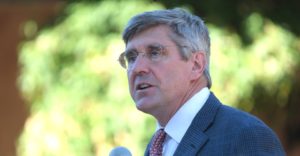Last week, we wrote about the “Professor Standard” for Federal Serve Board appointments. Today, we look at efforts to change that standard.
Former presidential candidate Herman Cain and Stephen Moore, an economic advisor to the Trump campaign, are out of the running for the two vacant seats on the Federal Reserve Board.
That means the seats will not be filled by the president’s first choices. Chances are high that they will not be filled with professors either, which had been the norm since Bill Clinton was president.
Moore, who played the lead role in the president’s tax reform and deregulation policies, ran into trouble because of articles he wrote from 2001 through 2003 that women should be banned from refereeing, announcing or bartending at men’s college basketball games. He said that the articles were meant to be humorous.
He also was held in contempt for shorting ex-wife by more than $300,000 for child support and alimony. Moore said that he maintains a friendly relationship with his ex-wife.
Moore accused CNN – where he used to work – and other media of “pulling a Kavanaugh against me” by bringing up articles he wrote many years ago, but even some Republican senators were reluctant to support his nomination.
Reporters dug through 2,000 articles, 500 speeches, several thousand television appearances and even Christmas letters going back more than 25 years, Moore wrote in The Wall Street Journal.
“In their effort to portray me as sexist,” he wrote, “they also contacted dozens of women I’ve known or worked with, and even girls I knew in high school. They failed to find one who impeached my character or behavior.”
Cain and Moore aside, three of the four Fed governors appointed to date by President Trump have not been academicians. Jerome Powell, who chairs the Fed, was an investment banker. Randal Quarles founded Cynosure Group, a private equity firm, and Michelle Bowman is an attorney who previously served as the banking commissioner of Kansas.
The only academician appointed has been Richard Clarida, the Fed’s vice chair, who was an economics professor at Columbia University.
Who’s Next?
It will be interesting to see who else is nominated by President Trump, who has repeatedly criticized the Fed and called for a more dovish monetary policy.
Before Cain and Moore, previous nominees were approved with little opposition. That could change if the president is perceived as seeking nominees who will share his monetary philosophy. But why would any president choose candidates with whom they disagree?
Maybe it’s time for a non-professor standard.

